1
Few leaders in the world have received as much love and praise as President Ho Chi Minh. Ho Chi Minh was loved and praised not only for his ideology and morality, but also for his style, including his very unique leadership style.
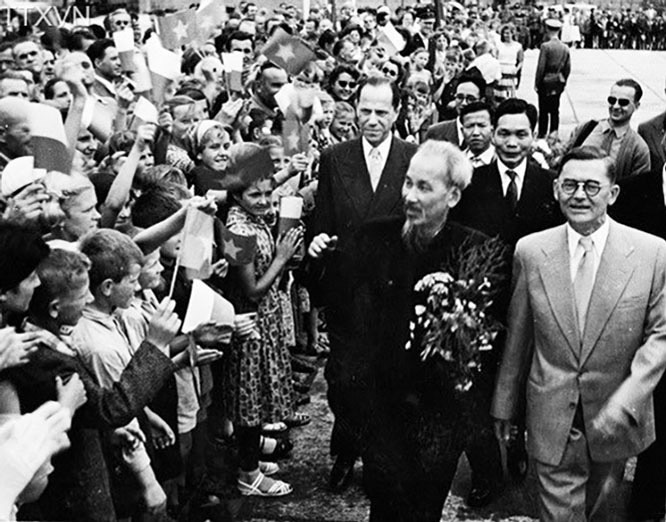
The Polish people warmly welcomed President Ho Chi Minh and the delegation of the Government of the Democratic Republic of Vietnam, July 1957.
Ho Chi Minh's leadership style not only evokes strong, positive emotions in those who interact with and learn about him, but also offers a valuable model for reference regarding a political leader in the modern and future world; it is not only an inspiration for political science researchers, but also for current political leaders.
In Ho Chi Minh's leadership style, there is a distinctive and unique characteristic: tolerance and magnanimity. Leadership is about the relationship between the leader and the led, where the leader's role is to guide the led. The leadership relationship does not exclude hard power, but is primarily based on soft power, on the leader's persuasive strength and the led's willingness. Therefore, tolerance and magnanimity allow for a comprehensive and thorough understanding, maximizing the scope of those being led; accepting differences; educating, nurturing, and supporting those who are weak or even those who have gone astray; fairly and objectively utilizing and developing diverse talents; preventing and eliminating flaws that could hinder personnel work; etc., thereby developing both the quantity and quality of those being led and promoting the success of the revolutionary cause. Such scientific, revolutionary, and humane tolerance and magnanimity also create, strengthen, and enhance the attractiveness and persuasive power of a leader, and therefore truly constitute a core value in leadership culture, a secret to leadership success.
The tolerant and magnanimous style of leader Ho Chi Minh is the crystallization of the essence of Eastern and Western political and cultural thought, national and international, tradition and modernity; it is a reflection of the revolutionary cause of the Vietnamese nation, which was just, righteous, open, and civilized under the leadership of Ho Chi Minh and the Communist Party of Vietnam; and especially, it is the embodiment of the soul, spirit, and noble character of leader Ho Chi Minh - a man of great humanity, great ambition, and great courage.
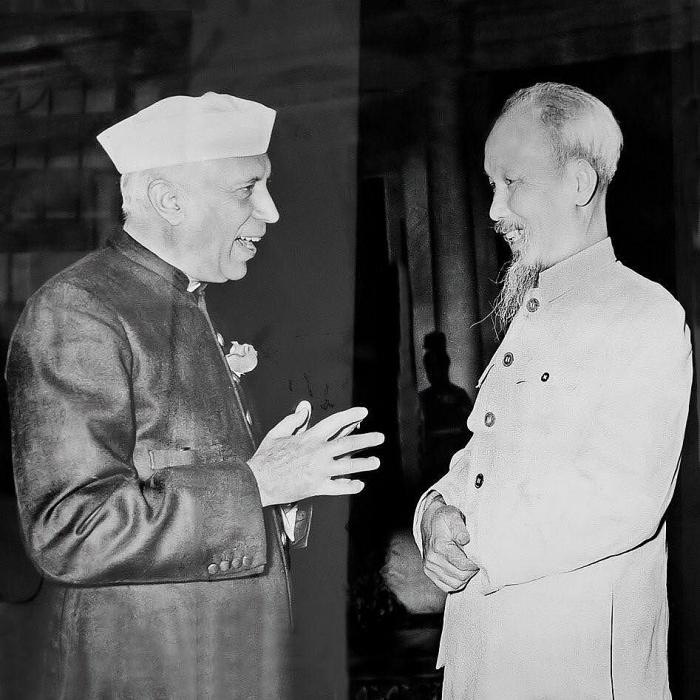
This image shows President Ho Chi Minh receiving Indian Prime Minister Jawaharlal Nehru in Hanoi on October 17, 1954. Jawaharlal Nehru, a world-renowned political leader, once wrote of Ho Chi Minh with great respect: “President Ho Chi Minh is a truly great figure in the world's history over the past 50 years: a gentle, affectionate, likable, unpretentious, humble man, a man of the people, a genuine man.”
In practice, President Ho Chi Minh's tolerant and magnanimous style became a unifying and transforming force, enabling him and the Communist Party of Vietnam under his leadership to mobilize and powerfully develop human and cultural resources, making a significant contribution to the great victories of the Vietnamese revolution. This is truly an invaluable resource that needs to be further studied and exploited, especially by the leadership team.
2
Ho Chi Minh was a man who unified knowledge and action, words and deeds, thought, morality, and style. This is also clearly seen when studying Ho Chi Minh's tolerant and magnanimous leadership style.
From an ideological standpoint, Ho Chi Minh consistently emphasized that tolerance and magnanimity are qualities of revolutionaries, especially of revolutionary leaders. This viewpoint remained consistent and unwavering in all different revolutionary situations. Depending on the circumstances, the target, and the nuances of the content, Ho Chi Minh used various terms to describe this style: forgiveness, leniency, tolerance, magnanimity…
In his lectures at the Vietnam Revolutionary Youth Association in 1925, later published as the book "The Revolutionary Path" (1927), when speaking about the character of a revolutionary, Ho Chi Minh clearly stated: "Be merciful to each individual."[1]The concept of tolerance here includes: (1) tolerance, that is, being generous and harmonious with everyone, and (2) magnanimity, that is, being forgiving towards others. This concept was reiterated by Ho Chi Minh in his article "The Exemplary Revolutionary" (September 18, 1926): "The exemplary revolutionary must be humble, tolerant, and magnanimous..."[2]In 1957, in a speech at the mid-level and high-level training courses of the Ministry of National Defense and the mid-level courses of the general departments, he emphasized: "Humility and generosity are two virtues that every revolutionary must possess."[3]What is particularly noteworthy is that, for leaders, Ho Chi Minh further emphasized the need for tolerance and magnanimity. While discussing Zhuge Liang's method of training military officers, Ho Chi Minh clearly stated: "Respecting virtuous and good people, favoring those who are just, being tolerant and upright, courageous and resourceful – that is the mark of a great general."[4].
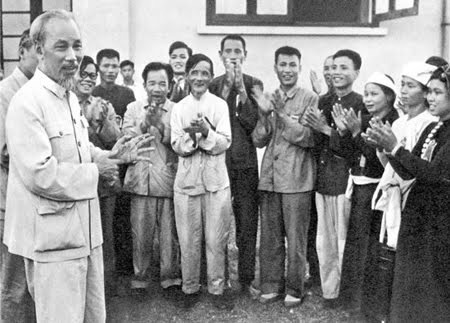
President Ho Chi Minh speaking with agricultural heroes and emulation fighters in 1957.
To help understand the true meaning of tolerance and magnanimity, Ho Chi Minh pointed out its opposite: narrow-mindedness – a manifestation of pride and self-satisfaction; and he repeatedly used comparative imagery to highlight the contrast between these two traits. For example, in his essay on pride and self-love, Ho Chi Minh wrote: “Pride is narrow-mindedness… For instance, a cup, because of its narrowness, can only hold very little water; adding a little more water will cause it to overflow. This is in contrast to the vast capacity of a lake, which can hold any amount of water.”[5]The person who drew the conclusion said: "Only with the magnanimity of a revolutionary can one be called truly magnanimous, like a river or an ocean."[6].
Thus, it can be seen that if style is the inner virtues expressed outwardly in one's way of life and behavior, consistently practiced and becoming a prominent characteristic of the acting subject, then for Ho Chi Minh, tolerance and magnanimity were a style of a revolutionary, including revolutionary leaders.
President Ho Chi Minh visits and extends New Year greetings to the staff and students of the Central School for Ethnic Minorities in Mountainous Areas, February 12, 1956.
Ho Chi Minh profoundly explained the value of tolerance and magnanimity from two perspectives:
Firstly, for me, it's about self-improvement. Someone pointed out: "A person with limited talent, virtue, and generosity, who cannot tolerate the opinions and criticisms of others."[7]Clearly, those who are unable to listen to and accept feedback and criticism, even from subordinates, cannot progress. Conversely, those who respect and accept differences, and seek common ground while respecting differences, not only demonstrate tolerance and magnanimity but also continuously cultivate their own morality and character, thereby growing and maturing.
Secondly, for individuals, it means gathering, educating, utilizing, and developing cadres, or more broadly, revolutionary forces.
According to Ho Chi Minh, "one must have great magnanimity to be able to treat cadres with impartiality and without prejudice, so that cadres are not left behind"; "One must have a broad-minded spirit to be able to get close to those one dislikes."[8]Thus, tolerance and magnanimity are essential to ensure that "cadres are not left behind," and to broadly unite forces. The higher the leadership, the more these virtues and qualities are needed, in order to achieve great unity. Only with great revolutionary unity can great success be achieved, and the future will surely be glorious. This viewpoint of Ho Chi Minh clearly demonstrates profound humanism and revolutionary character.
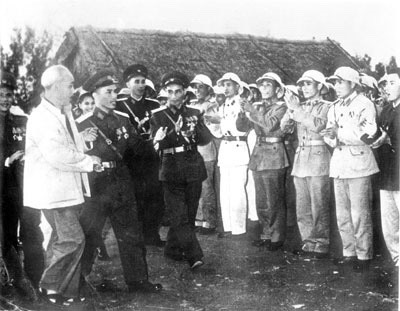
President Ho Chi Minh visits a military unit of Military Region 4 (in 1961).
He further pointed out that tolerance and magnanimity not only enable the broad and large gathering of forces, but also allow for the education and training of those who are less capable, thereby continuously improving the quality of the revolutionary forces. According to Ho Chi Minh's viewpoint, "one must be patient in teaching and guiding to support those who are less capable and help them progress."[9]"Older comrades must help younger comrades progress. This requires older comrades to have a magnanimous attitude and guide younger comrades. This is also a standard of communist ethics."[10].
According to Ho Chi Minh, tolerance and magnanimity are also the basis for utilizing cadres and revolutionary forces. He emphasized: "Tolerance means knowing how to use people."[11]Knowing how to use people, and skillfully employing them, will lead to an ever-increasing number of talented individuals, a growing and more powerful revolutionary force. That is the foundation of success.
Thus, it can be seen that if personnel work is the fundamental work of the Party, then tolerance and magnanimity, according to Ho Chi Minh's viewpoint, are a basis and prerequisite for successfully carrying out many aspects of personnel work. At the same time, they help avoid many harmful flaws in personnel work and in the gathering and development of revolutionary forces, such as cronyism, jealousy, contempt for the masses, etc. Because of this importance, according to Ho Chi Minh, tolerance and magnanimity must become the revolutionary's way of viewing the world, life, and people: "The revolutionary's perspective must be broad, and their attitude must be humble."[12]A broad and tolerant perspective allows one to see the great power of the world, of life, and of humanity, thereby reflecting on oneself and becoming humble. This outward-looking tolerance and generosity powerfully cultivates positive qualities within the individual when that perspective is turned inward. The value of tolerance and generosity, both to oneself and to others, is closely intertwined.
From an ethical and stylistic standpoint, Ho Chi Minh not only spoke of tolerance and magnanimity, but he himself consistently cultivated and practiced these virtues persistently and diligently, thus shaping his style. Countless examples can be cited of Ho Chi Minh's tolerant and magnanimous style, from his perspective to his interactions with various individuals throughout his revolutionary life. As Jawaharlal Nehru rightly observed: "President Ho was a man of broad magnanimity."[13].
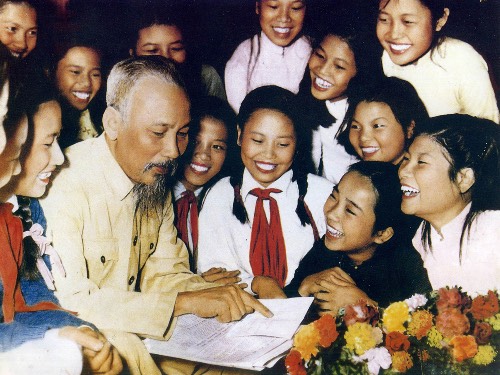
Uncle Ho and the children
In summary, it can be seen that Ho Chi Minh left behind many profound and valuable theoretical and practical views on the virtues and style of tolerance and magnanimity. Throughout his life, he consistently cultivated and practiced these virtues, thereby forming a unique and distinctive tolerant and magnanimous leadership style that holds immense value and inspiration for the present day.
3
The Communist Party of Vietnam takes Marxism-Leninism and Ho Chi Minh Thought as its ideological foundation and guiding principle for action, always attaching great importance to the work of building a contingent of cadres. In applying Ho Chi Minh Thought, the Party always emphasizes the comprehensive development of cadres in terms of ideology, morality, and style. On May 15, 2016, the Politburo issued Directive No. 05 on "Promoting the study and emulation of Ho Chi Minh Thought, morality, and style." Resolution No. 26-NQ/TƯ, dated May 19, 2018, of the Central Committee of the Communist Party of Vietnam on focusing on building a contingent of leading cadres at all levels, especially at the strategic level, with sufficient qualities, capabilities, and prestige, commensurate with the tasks, clearly stated that promoting the study of Ho Chi Minh Thought, morality, and style is one of the main tasks and solutions. Most recently, on May 18, 2021, the Central Party Office issued Document No. 731-CV/VPTW to news agencies and media outlets regarding the announcement of the Politburo's Conclusion on continuing to implement Directive No. 05-CT/TW, dated May 15, 2016, of the 12th Politburo "On promoting the study and emulation of Ho Chi Minh's thought, morality, and style."
In this context, from studying Ho Chi Minh's tolerant and magnanimous leadership style, we can draw a few insights as follows:
Firstly, it is necessary to raise awareness among leaders about the importance of studying Ho Chi Minh's leadership style, including his tolerant and magnanimous style. Ho Chi Minh's leadership style, proven through practical experience, not only helps to improve leaders but also serves as a secret to successful leadership and is a valuable asset in modern Vietnamese leadership culture.
Secondly, style is the outward manifestation of thought and morality. Therefore, building a tolerant and magnanimous leadership style must begin with cultivating tolerant and magnanimous thoughts and virtues in leaders. Leaders must have a profound understanding of tolerance and magnanimity, and tolerance and magnanimity must truly be virtues of leaders in their relationships.
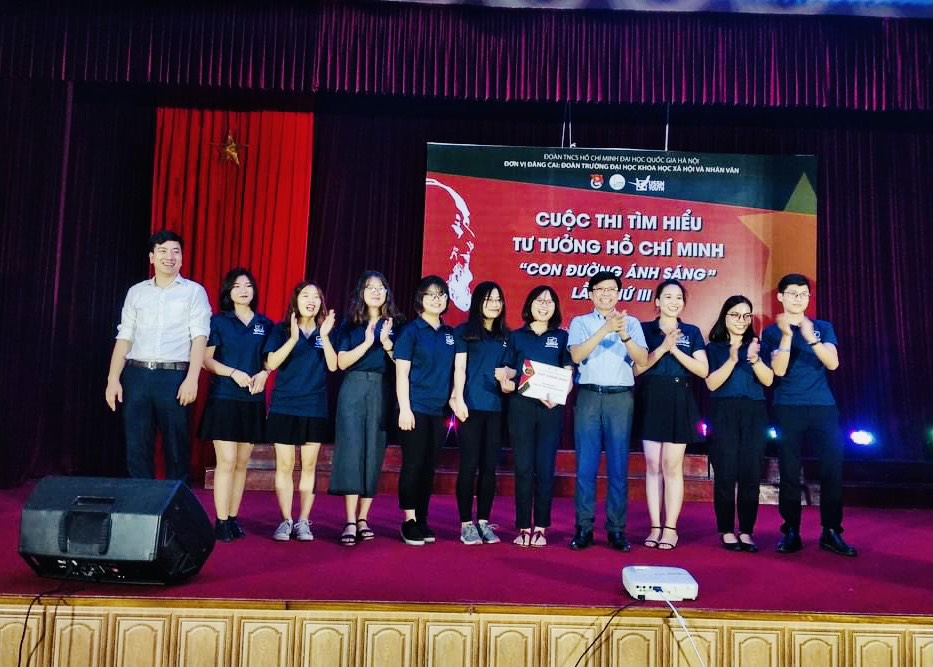
The third "Path of Light" competition on understanding Ho Chi Minh's ideology took place at the University of Social Sciences and Humanities.
Thirdly, the most important core of tolerance and magnanimity is benevolence. Benevolence is loving-kindness, it is the love and compassion of comrades for one another, and it is the love that leaders have for their subordinates and the people. Cultivating benevolence is building the core value for the tolerant and magnanimous style of leaders.
Fourth, the ideology, ethics, and style of tolerance and magnanimity are closely related to the self-cultivation and training of leading cadres as well as to cadre work. Therefore, building this ideology, ethics, and style must be carried out through specific plans, with high determination, and linked to inspection and evaluation from the organization, soldiers, and the people. In this, the self-aware efforts of leading and commanding cadres are very important.
In summary, Ho Chi Minh's tolerant and magnanimous leadership style is an invaluable resource. In-depth research and the application of a comprehensive set of solutions to cultivate this tolerant and magnanimous style in particular, and Ho Chi Minh's leadership style in general, for leading cadres, especially strategic-level leaders, is a task of profound scientific and practical significance.
Author:Assoc. Prof. Dr. Lai Quoc Khanh